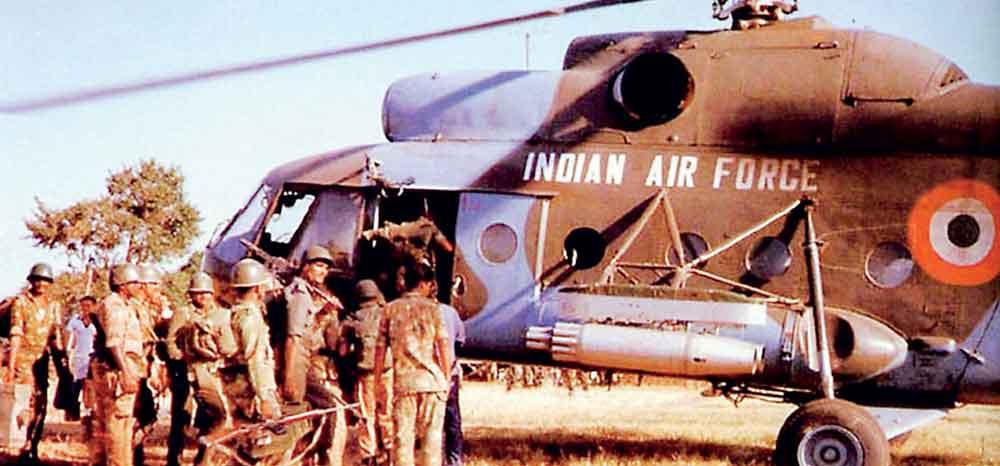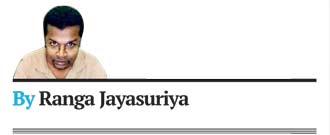IPKF could have finished the war long ago, Premadasa and JVP made us fight it and die
Posted on May 30th, 2025
Courtesy Daily Mirror

The push towards the removal of IPKF by R Premadasa is the spur which potentially fuelled the continuation of the war, killing many soldiers and civilians to come
 Last week, Sri Lanka commemorated the servicemen and women who paid with their life and limb, defending the territorial integrity of this country, so that the next generations could live in peace.
Last week, Sri Lanka commemorated the servicemen and women who paid with their life and limb, defending the territorial integrity of this country, so that the next generations could live in peace.
During the two-and-a-half decades of conflict, 28,619 military and police personnel died and another 40,000 suffered permanent disabilities.
The War Heroes Day, which falls on May 19, should be a day of recollection—though it remains a day of division. Probably, it is hard to expect it to be any different because no matter how you view it, it represents a defeat of a struggle in which various sections of Tamil society had heavily invested, even though the campaign ventured into nihilistic terrorism from very early on. That may be why, as the initial government announcements suggested, the president opted to skip the ceremony until a social media outcry compelled him to change his mind.
In this moment of reflection, one should ponder whether the immense loss of life and limb in the protracted war could have been avoided. I am not getting into the esoteric and highly polarised debate on the genesis of the conflict. It is indeed hard to offer a coherent explanation why the Northern elites, who had the best of both worlds well until the Black July, sought the destruction of this country on a set of propped-up grievances. That is notwithstanding the fact that by the time of Black July 1983, the Inspector General of Police, the Chief Justice, the Attorney General and President J.R. Jayawardene’s Chief Political Advisor were all Tamils.
Probably to find the causes of the ethnic problem, one should look as far as the years preceding the independence, when Chelvanayagam et al. liberally borrowed Mohammed Ali Jinnah’s Two-nation theory despite having witnessed the carnage of partition.
Therefore, let’s seek answers to a more earthly question: Wouldn’t this war have been fought to an end long before by the Indian Peace Keeping Force (IPKF)?
Had not President R Premadasa unceremoniously sent back the Indian Peace Keepers, who had by then confined the LTTE to the jungles of Mullaitivu, Sri Lanka could well have been in peace 18 years before the war was finally brought to its bloody conclusion on May 19, 2009.
The Indian Peace Keeping Force (IPKF) arrived in Sri Lanka in late July 1987 to enforce the cessation of hostilities agreed under the Indo-Lanka Peace Accord. Within months of their arrival, fighting flared up between the IPKF and the LTTE after Prabhakaran refused to be part of the Peace Accord. For the next two years, IPKF fought pitched battles with the LTTE. They dislodged the LTTE from Jaffna, initially having suffered heavy casualties in a botched parachute landing, then pursued the depleted LTTE to the jungle of Mullaitivu. The IPKF introduced weapon platforms hitherto unseen in the Northern Front and pounded the LTTE to smithereens with Mi-24 attack helicopters.
While fighting for its survival, the LTTE sent emissaries to Premadasa, who was easily duped and provided arms to the LTTE to fight the IPKF.
In April 1989, Premadasa demanded the withdrawal of the IPKF, fulfilling a precondition of the LTTE negotiators but also placating the JVP, which had launched a nihilistic campaign of terror in the South, making the Indian presence in the North their primary grievance.
Prime Minister Rajiv Gandhi readily accepted, and the last peacekeepers left in March 1990.
IPKF’s sacrifices are rarely mentioned in the public discourse in Sri Lanka.
In its two-and-a-half-year stay in Sri Lanka, IPKF lost three times as many military personnel as the Sri Lankan forces had suffered until then. The IPKF lost 1,165 personnel, and another 3,009 were wounded.
Premadasa not only armed the LTTE to fight the Indian peacekeepers but also condemned Sri Lankan forces to fight a war that the Indians had been fighting on our behalf.
Barely 3 months after the last contingent of the IPKF left the North, the LTTE attacked the police stations in the East, and Premadasa ordered 600 police officers to surrender to the LTTE, which massacred all 600.
It took another 19 years for the Sri Lankan forces, crippled by the vacillation of successive political leaderships, to finish the unfinished business left behind by their Indian counterparts.
Of the total of 28,619 military personnel killed during the war, 28,200 died during this period, and tens of thousands suffered permanent disability.
Tens of thousands of Tamil civilians perished, and generations lived in squalor in permanent displacement. Generations of Tamil children were turned into suicide bombers, and others were sent to the battlefront in a zombie sacrifice.
That is the greatest perfidy of the Sri Lankan politics, which no Sri Lankan pundit talks about. That absence of discussion may be due to inherent prejudices or the lack of commonsense realism, both ills that have incurred a heavy cost on the country.
Some other opinion-makers justify Premadasa’s folly on the claim that the IPKF had then been training a Tamil military force—so much for the bogeyman of the Tamil National Army, the whole group disappeared a day after the Indians left and were hunted down by the LTTE.
There are other village idiots, donning the mantle of experts, who take pride in the opposition to the IPKF and describe J.R. Jayawardene’s submission to Rajiv Gandhi to sign the Indo-Lanka peace accord as cowardice. The consequence of the alternative is now on display in Ukraine, whose leaders seem to have no qualms about sending the country’s youth to death, while the first couple adorns the front pages of the Vogue.
J.R. Jayawardene could not deliver on the promise of the free market, mainly due to his own egoistic follies. But, many of those negative consequences could have been contained had Premadasa let the IPKF finish the job and focused on delivering economic growth in the South.
Instead, his shortsighted opportunism cost the country two decades of prosperity. A compound of 2% of annual lost economic growth for 20 years, which would give a basic idea of how much we have lost economically because of one shortsighted political decision.
That Premadasa was killed by the terrorists he had armed and offered a lifeline would not absolve him from his original crime. He trapped us in a war that the Indians had been fighting and dying and were almost about to finish.
Irrespective of other differences, one should give it to Mahinda Rajapaksa for his political will to fight the war to its conclusion, come hell or high water. Wars are bloody affairs, and one should not begin them in the first place. And once in motion, it has to be fought to an end, and one side has to prevail, and the other should be annihilated (or close to it) if the peace is to prevail. That was true for the LTTE in the North is also true for the JVP in the South.
The JVP, which exploited every imaginary grievance in the country, including the presence of the IPKF in the North, is now firmly in the government. Its current political heights are a testament to Sri Lankan politics. In more than half of the world, it would have remained banned. The same political system could have made miracles of economic development had Premadasa diverted his newfound political autonomy derived from crushing the Southern insurgency into economic modernisation—in a mixture of Mahathir Mohamad and Pinochet. Instead, he sent back the IPKF and opened the doors of hell.